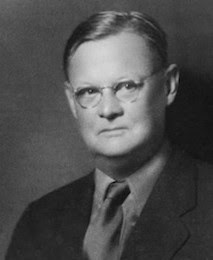A few months ago, I devoted myself to reading S.T. Joshi's magisterial, two-volume biography of H.P. Lovecraft, I Am Providence. Merritt's name comes up several times throughout, since HPL both admired Merritt's work (particularly The Moon Pool) and collaborated with him on the round-robin tale "The Challenge from Beyond." The biography notes that, about a month before he died, Lovecraft wrote a letter to C.L. Moore, in which he offered his "final assessment" of Merritt.
Abe Merritt – who could have been a Machen or Blackwood or Dunsany or de la Mare or M.R. James ... if he had but chosen – is so badly sunk that he's lost the critical faculty to realise it ... Every magazine trick & mannerism must be rigidly unlearned & banished even from one's subconsciousness before one can write seriously for educated mental adults. That why Merritt lost – he learned the trained-dog tricks too well, & now he can't think & feel fictinally except in terms of the meaningless & artificial clichés of 2¢-a-word romance. Machen & Dunsany & James would not learn the tricks – & they have a record of genuine creative achievements beside which a whole library-full of cheap Ships of Ishtar & Creep, Shadows remain essentially negligible.I must confess I was somewhat taken aback by Lovecraft's seeming change of heart about Merritt. Even given HPL's well known snobbery and views about the vocation of writing, this assessment comes across as exceedingly harsh, even cruel.
At the same time, I can see Lovecraft's point. Merritt's stories do include many of the "artificial clichés of 2¢-a-word romance," from square-jawed heroes to diabolical villains to innocent damsels in distress. The presence in his stories no doubt explains why they were so popular with his readers – and why Merritt enjoyed a much more successful career as a writer than did Lovecraft. Many, if not most, of Merritt's stories touch upon the same themes and play with the same concepts as HPL's tales of cosmic horror, but the cosmicism of Merritt's stories are leavened with the human. They are thus much more approachable and appealing to a wide audience, something Lovecraft never even attempted to understand.
The irony, of course, is that both of Lovecraft's great correspondents and friends, Robert E. Howard and Clark Ashton Smith, understood this. Neither shied away from crafting stories that would make them more saleable and popular, even if both would occasionally grumble at having to do so. That's why they both, like Merritt and unlike HPL, were able to provide for themselves and their parents with steady streams of work. Howard, Smith, and Merritt all had no qualms about playing to their markets, even as they produced excellent work that has, in my opinion, stood the test of time.
For me, that's the real point here. Merritt's best stories, like The Moon Pool or The Metal Monster, both of which Lovecraft appreciated, are not lessened by their inclusion of down-to-earth characters and sentiments – what HPL called "pulp hokum" in one of his letters. Their greater accessibility is not a flaw. To put it another way, simply because something is popular does not mean that it is necessarily bad. Lovecraft, I fear, commits the error – I know this because I often guilty of it myself – of assuming that anything that is loved by the masses must by lacking in substance. In addition, he's judging Merritt's success as a writer by his own subjective (and deeply idiosyncratic) standards, which is, in my opinion, deeply unfair.
Yet, for all of this, there can be no question that Lovecraft's own work owed a great deal to the stories of Abraham Merritt. Without The Moon Pool, for example, there might never have been "The Call of Cthulhu," a tale upon which so much of HPL's eventual fame rests. No sneering critiques of his "magazine trick[s] & mannerism[s]" can change that. Nor can they change the fact that writers as diverse as Robert Bloch, Michael Moorcock, Richard Sharp Shaver, Karl Edward Wagner – and, yes, Gary Gygax – thought very highly of him and his imagination. That's not nothing.
In the end, Merritt needs no defense against H.P. Lovecraft or indeed anyone. His work speaks for itself, however poorly known it is in the 21st century. That's why I urge you, if you haven't done so already, to seek out his stories and read them. Most are available for free online and are well worth your time.



I second your motion. If anyone has not read Merritt's work, just take a look at one of his stories. It doesn't really matter which one you read but when you do, you'll get an idea why he was called "The Lord of Fantasy" in his day. As you say, well worth the reader's time.
ReplyDeleteI have read Merritt, having found out about him and Dunsany through Appendix N and other writings on the source of the hobby. While there is a lot of bile in HPL's final assessment, I think his criticism has some merit. I found little suspense in the stories and m
ReplyDelete“In this great crucible of life we call the world—in the vaster one we call the universe—the mysteries lie close packed, uncountable as grains of sand on ocean’s shores.”
ReplyDeleteThe Metal Monster is possibly my favorite Merritt tale so far. And I put it off for a long time because I expected the “Monster” to be some standard robotic nemesis. Instead it’s a cybernetic religion, and the danger of dehumanization when we rely so much on an immersive technology.
“I felt myself as fragile as a doll of glass in the hands of careless children.”
Just because Lovecraft is a genius doesn't mean he's not a complete ass.
ReplyDeleteYeah. Sadly a lot of geniuses are also asses. Humans are flawed.
Delete